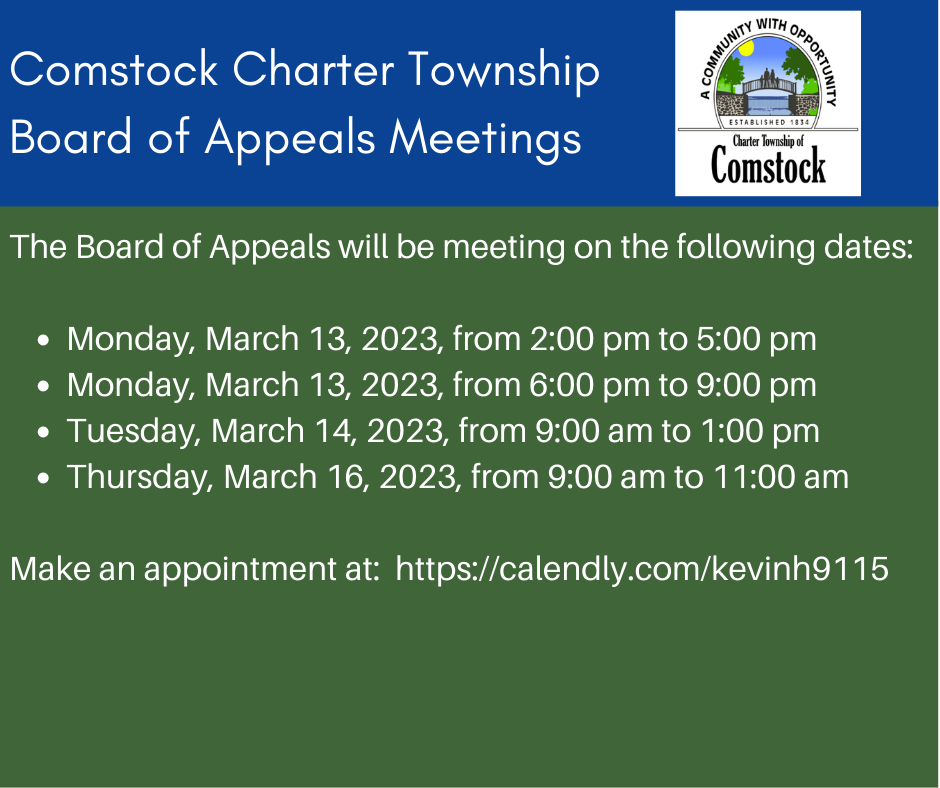Board of Appeals Meetings 2023 Schedule

The Comstock Charter Township Board of Appeals will hold 5 meetings in March 2023. All meetings will be held in the Township Hall at 6138 King Highway, Kalamazoo, MI 49048. The board will meet to examine and review the assessment roll. The board will convene on the following dates to hear appeals of assessments or taxable values, poverty exemptions, parcel classification appeals, and/or current-year qualified agricultural denials:
- Tuesday, March 7, 2023, 8:30 am Organizational Meeting
- Monday, March 13, 2023, 2:00 pm to 5:00 pm and 6:00 pm to 9:00 pm
- Tuesday, March 14, 2023, 9:00 am to 1:00 pm
- Thursday, March 16, 2023, 9:00 am to 11:00 am
Appeals are on a first-come, first-serve basis. Letter appeals are accepted, but must be received before 5:00 pm Friday, March 10, 2023 (Postmark not accepted). If you file a written appeal, make sure to include a petition with your appeal. A link to the petition can be found here (petitions will be provided at in-person appointments). You can schedule your appointment at https://calendly.com/kevinh9115. Appoints are highly recommended, but not required for hearings.
Frequently Asked Questions:
How do I make an appeal?
The Board of Review needs good reasons to alter an assessment. It is important to be able to answer the questions “What do you think your property is worth?” and “what are you basing that opinion on?”. Many real estate websites offer information on recently sold homes. Finding recently sold homes that are truly comparable to yours is a great way to get an idea of a market value for you to dispute your assessment. Don’t forget to bring documentation supporting your appeal!
What’s the difference between assessed value & taxable value?
The assessed value is 50% of the market value. This value fluctuates each year based on the local real estate market. So, if you multiply your assessed value by 2, that would be the approximate market value of your property.
A taxable value is the amount of value of your property that is used to calculate property taxes. With the passing of Proposal A in 1994, all properties became “capped” & their taxable value was created. Proposal A was designed to limit the amount of increases in property taxes each year. There are only 3 ways your taxable value can increase;
1) the rate of inflation/consumer price index, which is applied to every parcel in the state each year. For 2023, the inflation increase is 5%.
2) physical changes to your property and
3) a transfer of ownership. Your taxable value will “uncap” to equal the assessed value the year after a transfer of ownership.
How does the assessor determine my property assessment?
Each parcel in the township has a property record card that contains all of the information we have on file for a property. It includes land size, house information, such as style, size and age, and any out buildings. The assessor uses the State of Michigan mandated cost manual to apply value rates to the different attributes to determine the reproduction cost of your structure. The age and condition of the buildings are then considered to apply depreciation to the reproduction cost. This is how a base cost of the property is established. Sales that have occurred in the township are then evaluated to determine land value rates and changes to the local real estate market.
My neighbor & I have very similar homes. Why is my taxable higher than theirs?
If you have a home that is truly similar to your neighbor’s home, your assessed value should be similar to theirs; however, the taxable values would probably not be the same. Each taxable value will depend on when the property was ‘capped’ due to the most recent transfer of ownership. The year following a purchase, the taxable value is recalculated at the current market value. If your neighbor has owned their home for a few years, there might be a large difference between their assessed and taxable values. The assessed value and taxable value are not the same and should not be compared when evaluating a tax bill.
How is my tax bill calculated?
Your property tax bill is calculated by multiplying the taxable value of your parcel by the millage rate multiplier. The assessor has no authority over millage rates that are levied.
